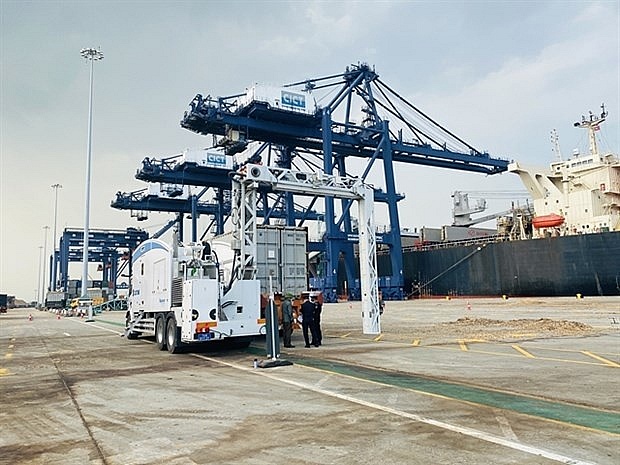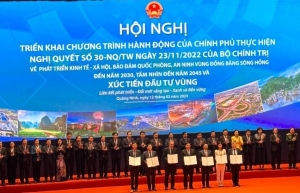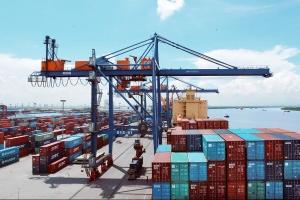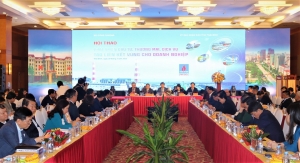Progress outlined in new PAPI evaluation
The 2022 Provincial Governance and Public Administration Performance Index (PAPI) report was released on April 12 by the United Nations Development Programme, and highlighted public optimism contrasted with the concerns of the COVID-19 pandemic era.
 |
| Inspectors examine a container at Cai Lan port in Quang Ninh province. More ports need to be built to promote inter-regional ties. (Photo: VNA) |
The report provides an important check on government performance two years into its term, and also reveals changing public sentiment in the fight against corruption amid high expectations and evolving aspirations.
The three provinces of Thua Thien-Hue, Binh Duong, and Thanh Hoa are still in the top five alongside Quang Ninh and Ninh Thuan.
Quang Ninh was the top locality in the country, with the highest scores in terms of transparency, vertical accountability, public administrative procedures, and e-governance. There are eight PAPI criteria in total.
According to PAPI researcher Dang Hoang Giang, Quang Ninh has worked to ensure locals are the beneficiaries of new policies, including the planning of projects, compensation for seized land, and local votes for local people. The province has also consulted people and the business community on how to improve socioeconomic development.
On March 11, after the prime minister approved the long-term master plan for Quang Ninh’s Halong city, the province organised an online conference to connect communes and districts with key information on public policy.
“Publicity and transparency have become the key to implementing democracy in the province. Quang Ninh’s authorities are willing to directly speak with local people to listen to their difficulties. In 2022, all complaints were resolved on time,” Giang said.
Meanwhile, Thanh Hoa oversaw new and innovative models and solutions, applying sound and effective measures in administrative reform. It also focused on improving the quality of public employees, reforming state administrative agencies, building e-government, and improving public services.
The province has enhanced the online settlement of administrative procedures, saving cost and time for residents and organisations. There has also been a transparent reduction in red tape.
Ninh Thuan, Binh Duong, and Thua Thien-Hue have carried out similar reforms
The report shows six of the top performers are in the Red River Delta, north-central, and central coast, and the 14 poorest are in the Central Highlands, Mekong River Delta, the northern midlands, and in mountainous regions.
Interestingly, the gap between the lowest and the highest possible provincial scores was narrower than in 2021.
Compared to 2021, 33 cities and provinces performed significantly better in local level participation, 18 in transparency in local decision-making, and 30 in e-governance. However, 29 localities performed significantly worse in environmental governance, 18 in controlling corruption in the public sector, and 18 in public service delivery.
Along with public consultation on governance and public administration performance, the report also shows the top concerns of Vietnamese citizens by raising open-ended questions. The key concerns are poverty, economic growth, jobs, road quality, and corruption.
Another researcher for the report, Dr. Paul Schuler, said, “Each year, the PAPI survey asked citizens to assess the issue of greatest concern they think the national government should prioritise in the coming year. In 2022, more than 22 per cent said poverty reduction was their top concern, followed by economic growth, then jobs and employment. Road infrastructure emerged as the fourth issue of greatest concern, followed by corruption.”
“Citizens have strikingly different expectations for the national government compared to the provincial, district, and grassroots levels,” he added. “While citizens want the national government to address economic issues, they largely look to low levels of government for infrastructure and public service delivery. Road quality and land, in particular, are key issues that respondents associate with the provincial level.”
With a record 16,117 respondents randomly selected from all Vietnamese cities and provinces, PAPI is in a unique position to deliver invaluable insights into government performance at all levels two years into its 2021-2026 term.
“Over the past 14 years, PAPI research has had a positive impact, transforming the awareness and actions of provincial authorities,” said Dr. Nguyen Huu Dung, vice president of the Vietnam Fatherland Front Central Committee. “The research and analysis of citizens’ assessment of the provincial governance and public administration performance provide important indicators that help policymakers adjust policies and innovate operating methods as needed.”
 | Nearly $10 billion committed to Red River Delta region Almost $10 billion was committed to the Red River Delta region at a conference for the government's action plan for the development and safeguarding of the area until 2030 that took place yesterday in Halong, Quang Ninh. |
 | Red River Delta to develop more transport infrastructure projects By 2045, the Red River Delta region targets developing a synchronised and modern transport infrastructure system through investments in roads, rivers, railways, and aviation. |
 | Promoting interregional linkage in the Red River Delta The promotion of interregional connectivity throughout the Red River Delta has been identified by the Party and state as an important policy to exploit the maximum potential of the area for socioeconomic development. |
What the stars mean:
★ Poor ★ ★ Promising ★★★ Good ★★★★ Very good ★★★★★ Exceptional
Related Contents
Latest News
More News
- SK Innovation-led consortium wins $2.3 billion LNG project in Nghe An (February 25, 2026 | 07:56)
- THACO opens $70 million manufacturing complex in Danang (February 25, 2026 | 07:54)
- Phu Quoc International Airport expansion approved to meet rising demand (February 24, 2026 | 10:00)
- Bac Giang International Logistics Centre faces land clearance barrier (February 24, 2026 | 08:00)
- Bright prospects abound in European investment (February 19, 2026 | 20:27)
- Internal strengths attest to commitment to progress (February 19, 2026 | 20:13)
- Vietnam, New Zealand seek level-up in ties (February 19, 2026 | 18:06)
- Untapped potential in relations with Indonesia (February 19, 2026 | 17:56)
- German strengths match Vietnamese aspirations (February 19, 2026 | 17:40)
- Kim Long Motor and AOJ Suzhou enter strategic partnership (February 16, 2026 | 13:27)

 Tag:
Tag:




















 Mobile Version
Mobile Version